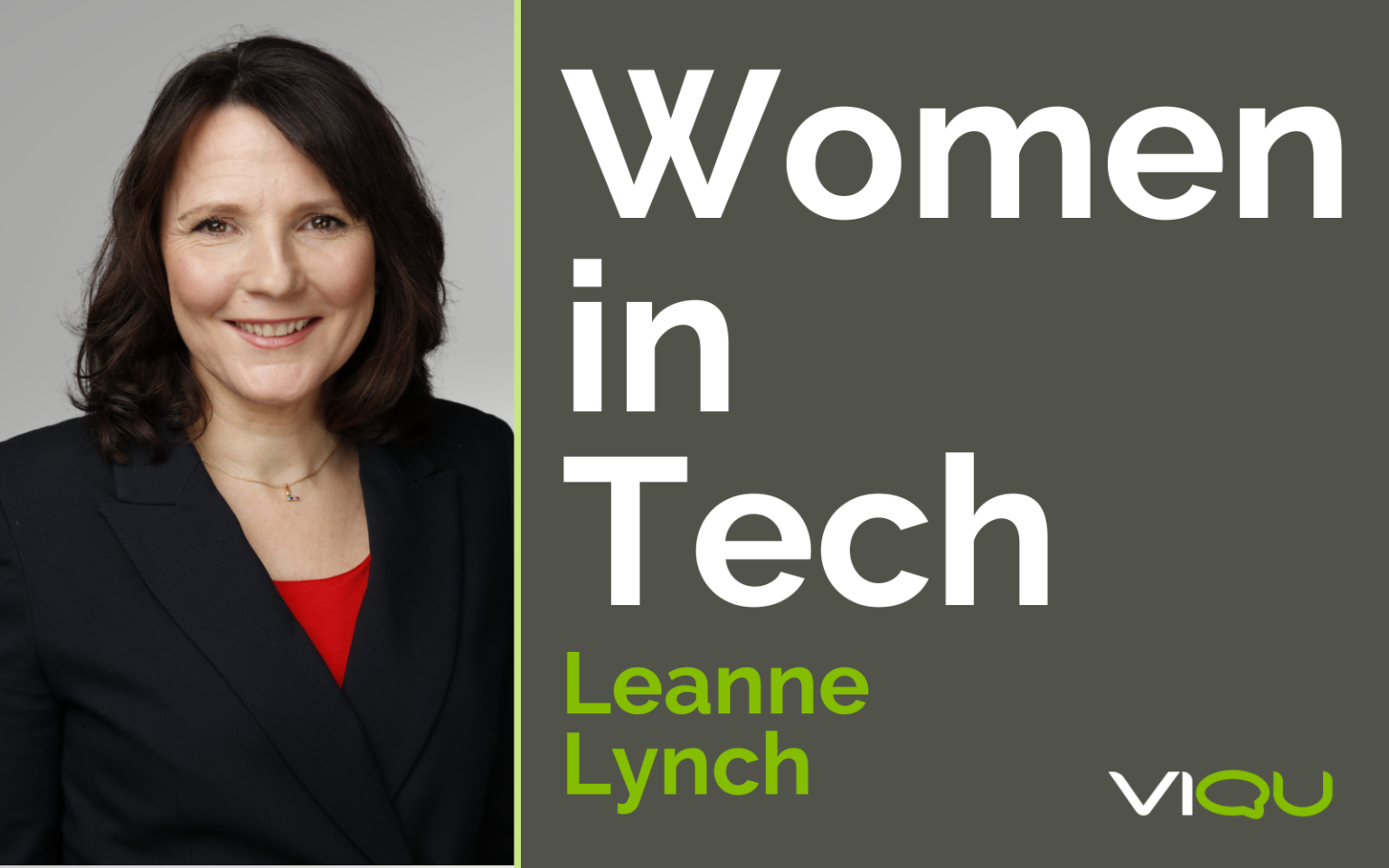Women In Tech: Interview With Director Of Technology & Cyber Defence, Leanne Lynch

With recent figures highlighting how women account for just 30% of under 30’s in the cyber security workforce, there is certainly a long way to go in the representation of women and other under-represented groups within IT, especially in cyber security.
In my latest interview in our Women in Tech series, I had the pleasure of speaking with Leanne Lynch, Director of Technology and Cyber Defence at Heathrow.
In this Q&A, we discuss how Leanne started her journey in tech, how her path led her to become a Director of Cyber Defence – a notoriously male-dominated area of tech, and her views on instilling a passion for technology in women from an early age.
As the Director of Technology and Cyber Defence at Heathrow, what are your responsibilities?
I look after all of the IT that underpins Heathrow. As well as the cyber defence that provides a protection ring around us.
Heathrow is comparable to a small city. We have all the services and experiences that you would normally expect there to be when you visit a city; from how you reach Heathrow, all the way through to eating, buying and staying at Heathrow. Then we ensure you and your bags reach your plane on time, in addition to welcoming you back when you return.
When you think about that city, the technology that underpins it is complex. We look after all the technology you’ll engage with as a passenger –websites, information screens, self-bag drop – anything front-facing. Then there’s the tech that supports our colleagues, and the network and infrastructure that connects the terminals.
Whilst Heathrow is a single physical location, the technology that supports it is complex. and we must keep it cyber secure.
I can imagine no day is the same for you, but can you describe a typical day?
There isn’t a typical day at Heathrow. Today has been about our fast-moving cloud technology. Yesterday was resilience. Tomorrow is about getting an exec paper together to showcase our direction of travel.
I have a very diverse team in terms of demographics, but also in the way they think. Each day brings different ideas and challenges. I don’t think I’ve had a day where I could say ‘that was the same as yesterday’ in the 3 years I’ve had this role.
Are you fully remote or office-based now?
Even before Covid struck, we were encouraged to try to work from home minimum 2 days per week and I have fallen back into that pattern.
I certainly love the flexibility that working from home brings but being in the office is irreplaceable. Coffee room chats, bumping into people you haven’t spoken to for a while, and witnessing first-hand some of the challenges that could be resolved easily, is invaluable. I would never want to work 100% remotely in this role.
What’s the size of your team?
We run efficiently. My direct team across cyber and technology went down during Covid, but we’re back up to just over 100. We do work very much on a core capability basis and then we deliver through our partners.
How did a degree in History lead to you pursuing a career in technology?
I studied History and wanted to be a history lecturer. When I finished my degree, I took a role with a Cable TV company, capturing sales orders and passing them over to the engineers.
Whilst in the role, an international technology company came in to replace the billing and customer care system, and I got involved with doing the internal training. The organisation ended up asking if I’d like to come and work for them as their international trainer and the opportunity to travel for work and do something I had really enjoyed, made it an easy, ‘yes please!’.
To do that role I had to learn how to use the application, and then how to train database and network administrators so they could set it all up. By doing that I learned more and more about technology and the part it played in enabling the business to achieve its ambition. And that’s really where I started my journey in IT.
Do you think your degree and passion for history has helped your career at all?
When you study history, you learn what drives people, what triggered historical events and what made certain technological advances stick and change society. This really aligns with what I love about working in technology. Understanding what the vision of the business is, who the customers are and bringing all of that together to understand what technology is needed to achieve and sustain.
Do you think the fact that you never planned to have a career in IT helped or hindered you?
Technology is driven by what people need to make their environment and work more efficient, enjoyable and easier, and there is room in technology for all sorts of skillsets and backgrounds. It is an industry where you can learn on the job or arrive with an IT education and build on that. The paths will be different, but it’s a broad industry with lots of opportunities to explore.
For example, when I joined Heathrow, our Office 365 SME was our Team Administrator. She showed a talent for taking ideas and creating amazing digital workplace experiences. She applied for and was successful in our digital workplace team and now drives our Power Platform and our Hub experiences. She’s phenomenal.
Our Power Platform ambassador was previously a security guard and he’s been on stage with the CEO of Microsoft and won countless awards.
Like me, neither of these people ever planned for a career in technology, but they fell in love with the area and developed a passion for making it work.
You’ve had a number of roles at different companies and organisations, what are the key drivers that have pushed your career to where it is today?
I’ve always enjoyed trying to understand the challenge and what sort of changes need to be put in place. Transformation with technology is about people and will only work by understanding the ask, the need and bringing people on the journey so that the change can be sustained.
Looking back, each role I have had has involved new transition or transformation, and not just delivering it, but delivering it in a way that was used, can be evolved and sustained.
Have you noticed a lack of women in IT throughout your career?
When I started in IT, I was often the only woman in the room. This was also the case when I started sitting at leadership tables, though this is changing now.
I’ve had some amazing bosses who have been inclusive, and I’ve been fortunate to have women in leadership positions above me who have stepped in to give me a voice if I wasn’t in the room. They’ve used their position to bring me along. As I’ve moved into leadership roles, I’ve wanted to do the same for other women in technology. When you get a seat at the table, it is an opportunity to give a voice to those who are not at the table and continue to move the dial on diversity.
Do any moments come to mind where you have been particularly aware of the fact you are a woman in a male-dominated industry?
Yes, recently I attended a CIO round table event, where I asked an event organiser whether I should go into the room. He said not yet as it was just the leaders in the room. Assuming that he meant the company hosts were doing a pre-meet, I waited, but I noticed a couple of other attendees I knew going in. I went back and reiterated that I was there to participate in the round table. I was then directed straight in, with an apology, saying that he had thought I was an event organiser from the host company. Granted, I was the only woman at the table that day…
Another recent experience was a cyber event I attended. There were 50 men and only 2 women.
What changes would you like to see to encourage more women to pursue careers in technology?
When I look down the talent pipeline, the mix is getting a lot richer. Where I’m most worried is when you look at schools, the mix disappears again. Maybe I shouldn’t be worried as if you looked back on when I was at school, you wouldn’t see me on that ‘table’, but here I am!
There are many routes and paths to IT, and businesses need to work with local education (schools and colleges) to bring it to life and make it a lot more interesting and attractive to young women.
Children and young people use technology to make stories on Snapchat, Instagram etc. They put an entire storyboard together for a 20 second clip. Imagine taking that ability and giving them business data to tell the story with. So many young people have the basic building blocks. It’s about businesses working with schools to encourage children to take that interest to the next level.
I truly believe that if more businesses partnered with schools and colleges, the dial would move in a positive direction far more quickly than it is now.
Which moments in your career are you particularly proud of?
It must be stepping up to my current role when Covid hit. I had to jump into a new level of leadership and learn about a business I had recently joined.
It was one of the most challenging periods of my career. I downsized and reorganised the entire department. As a newly formed team, we cut spending, and stopped projects, but remained agile enough to respond innovatively to the changes in the airport as Covid evolved. This was against a backdrop that wasn’t just impacting the business, but home life too. Since then, we have built back up the team, accelerated our digital ambition, focused on reducing technical debt and improved our Cyber Posture. It really was one of the biggest transformations I have led, and its success is down to the team, understanding who the experts are and listening to them.
Who has inspired you in your career?
I have worked for some great leaders. I’ve been very fortunate. I have also worked with people who have challenged my way of thinking, which has had a positive impact. I would list them all, but I think that would be an interview all to itself! Here are a couple:
- Cindy Hoots. I was really fortunate to have the opportunity to work for her. Cindy changed my mindset and approach. Her leadership style really empowered me to pay things forward. The learnings I took from working with her continue to direct me now.
- Franciose Russo for representing my interests, and giving me a voice when I was not in the room.
- One of my first bosses, Meg Kauffman who had the ability to challenge without being confrontational, something I will always aspire to achieve. As a leader she took the time to ensure I was included and as it was so early in my career, to also teach me the office and corporate skills that are often unsaid. I still remember her top tip that no matter how annoyed an email has left you, write a response whilst smiling, step away, re-read and then decide if it is right to send.
- There are those that I always turn to for counsel, because they have taken the time to know my strengths and will give me candid advice, feedback and guidance. Karen Gallantry, Mark Vassallo and Kate Spresser to name a couple.
What advice would you give young women who are looking to get into technology?
Don’t overthink what is next. Take the opportunities when they come. If something’s not working, talk to your line manager and the people around you. Learn how to use your boss and peers to progress your career. If you’re in the wrong place or wrong part of technology, it’s okay to move on. Try something else. Don’t give up.
I’d also say to never come to a table you’ve been invited to thinking you must earn your seat. The fact you have been invited, means you already have, and an inclusive table will make room for you. I’ve learned from my own experiences how important feeling included is to my ability to succeed and so I will always counsel, if asked, individuals who have joined my leadership team that they have earned the seat and now it’s mine and the rest of team’s responsibility to embrace the diversity they bring.
Thank you for reading our latest interview in our Women in Tech series – you can access more interviews from the series here.
Please click here to get in touch if you are looking for talented individuals to join your tech team!
Similar articles you might like...

Forgoing Using Contract Cloud Migration Specialists: Benefits Vs Drawbacks
Cloud migration specialists are vital professionals but tight budgets are making companies consider alternative ways to deliver projects.

How Government Support Aims To Boost The UK’s Cyber Security Sector
The UK's cyber security sector has seen significant investment from the Government over the past decade, with the hopes to protect the UK against rising cyber threats.
Latest jobs
Full Stack Developer
 Glenrothes, United Kingdom
Glenrothes, United Kingdom
 £40k - 50k per year + Bonus
£40k - 50k per year + Bonus
Full Stack DeveloperSalary: £40,000 - £50,000 per annum plus bonusGlenrothes, Scotland (Full time on site)VIQU have partnered with a leading organisation who are looking to recruit a full stack developer join their development team. The...
Site Supervisor
 Stone, United Kingdom
Stone, United Kingdom
 Market related
Market related
Job Title: Site Supervisor Location: Stone (on-site)- must have full UK Driving License. Salary: market- relatedVIQU has partnered with a top engineering company seeking a Site Supervisor to create and manage project plans. The...
Site Manager - Nuclear Division
 Staffordshire, United Kingdom
Staffordshire, United Kingdom
 Competitive Salary
Competitive Salary
Site Manager - Nuclear Division - Competitive SalaryLocation: StaffordshireVIQU have partnered with a company that has been leading the charge in advanced system integration for decades. The Role:We're looking for an experienced Site Manager with strong...
Telephony Engineer
 Cardiff, United Kingdom
Cardiff, United Kingdom
 £35k - 45k per year
£35k - 45k per year
Telephony Engineer - 12 Month FTC – £35- £45,000 Location: Cardiff (Minimum 3 days on-site) Company: VIQU - Partnered with a Public Sector OrganisationVIQU is working with a Public Sector client to find an experienced...
Solution Architect
 London, United Kingdom
London, United Kingdom
 £650 - 750 per day + Inside IR35
£650 - 750 per day + Inside IR35
Solution Architect – Workplace Modernisation – 12 months ContractA Global Firm are at the start of a Workplace Modernisation programme of work and require a Solutions Architect to join the team and help design this...



